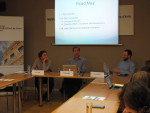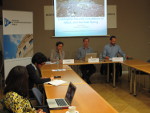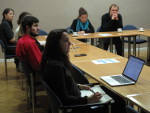Affect and the Arab Spring
The Institute of International Relations would like to cordially invite you to a lecture with Dr. Ty Solomon, Lecturer in International Relations, University of Glasgow on the „Affect and the Arab Spring“.
10. 11. 2016 (17:00)
This content is not up to date Institute of International Relations Prague, Nerudova 3
[youtube]http://www.youtube.com/watch?v=6TfSqnnffCU[/youtube]
- Speaker: Dr Ty Solomon, Lecturer in International Relations, University of Glasgow
- Discussant: Jan Daniel, Research Fellow, Institute of International Relations
- Chair: Jakub Eberle, Research Fellow, Institute of International Relations
- Format: Lecture followed by a discussion
The lecture will focus on the Arab Spring through the lenses ontological security and affect/emotion. It will argue that mobilizations of affect are key to understanding the constitution and spread of the Arab uprisings, as well as a broader range of phenomena in International Relations (IR).
Ontological security research in IR generally argues that agents pursue both physical security and a secure sense of self. The lecture will ask what may be gained by shifting the focus to the wider settings within which this occurs. What analytical purchase may be gained by refocusing the study of ontological security not strictly on subjects, but on agents’ broader affective environments? Building on different literatures, the lecture will suggest that ‘circulations of affect’ can reinforce agents’ sense of security within cognitively unstable environments that are typically viewed as inducing insecurity. In this sense, tracing trans-personal circulations of affect positions ontological security within the broader social processes out of which securityseeking subjects are formed. The empirical purchase of these concepts will be illustrated through an analysis of articulations of security and subjectivity in the Arab Spring uprisings.
The report fromt he event is available here.
Dr Ty Solomon is Lecturer in International Relations in the School of Social and Political Sciences, University of Glasgow. His research is concerned with the overlapping influences of language and identity in the politics of security and foreign policy. His recent book, The Politics of Subjectivity in American Foreign Policy Discourses (University of Michigan Press), analyzes how foreign policy narratives emotionally appeal to audiences. His other work and interests include a genealogy/conceptual history of the concept of "weapons of mass destruction," the politics of neoconservatism in American foreign policy, the relationship between emotions and power, the politics of space and place, and the role of time/temporality in politics. He has published in journals such as International Studies Quarterly, European Journal of International Relations, Review of International Studies, Cooperation and Conflict, Millennium, and New Political Science.



